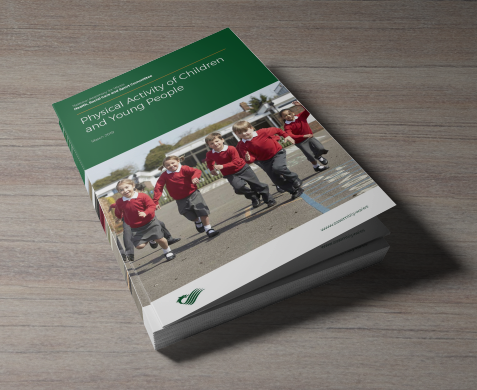The Assembly will debate the Health, Social Care and Sport Committee’s report on its inquiry into physical activity of children and young people (PDF, 1015 KB) on 12 June 2019.
Guidelines issued by the four Chief Medical Officers (CMOs) of England, Scotland, Wales and Northern Ireland include:
- All children and young people (aged 5-18) should engage in moderate to vigorous intensity physical activity for at least 60 minutes and up to several hours every day.
- All children and young people should minimise the amount of time spent being sedentary (sitting) for extended periods.
The Welsh Government told the Committee that overall, 51% of children aged 3-17 meet recommended guidelines, and only 14 - 17% of children aged 11-16 years do the recommended amount of physical activity.
The Committee heard evidence that levels of physical activity and sedentariness among children in Wales are some of the poorest globally. A higher proportion of children in Wales are overweight or obese, and report unhealthy lifestyle behaviours, compared to other UK nations.
The Committee says it heard compelling evidence that Fundamental Motor Skills need to be taught at an early age, and there is a misconception that all the skills required will develop naturally in childhood. Members were concerned to hear views that there is currently a gap in the foundation phase in terms of teaching these skills, and believe this must be addressed. They agreed with stakeholders that schools have a vital role to play in getting children and young people to be more physically active.
Members also found that physical activity is being squeezed out of school timetables due to curriculum pressures, and the majority of schools across Wales are not meeting the recommended 120 minutes a week for physical education. The report makes a number of recommendations to address these issues, and calls for better teacher training on physical activity. It states:
It is clear to us that physical activity is not given enough priority in schools – this must change. The development of the forthcoming new curriculum offers a fantastic opportunity to redress the balance and give physical activity the attention and priority it deserves.
We agree with stakeholders that the recommended 120 minutes a week should be a statutory minimum requirement. We also agree that to elevate the status and priority given to physical activity in schools, it must be inspected by Estyn; both to monitor compliance that the 120 minutes is being adhered to, and also to assess the quality of physical education experience.
The Committee also believes that all schools should provide wider access to their sport and activity facilities to local communities to encourage more physical activity outside of the school day. The report calls for the Welsh Government to make Community Focused Schools a reality for everyone, and ensure consistency of access to activity facilities beyond school hours across Wales.
Members concluded that ‘if we don’t start taking urgent action now to change attitudes towards physical activity, we are storing up problems for generations to come’.
The Committee made 20 recommendations for action. The Welsh Government subsequently responded (PDF, 435 KB), accepting 13 of the 20 recommendations; ‘accepting in principle’ five recommendations, and rejecting two recommendations.
One of the rejected recommendations was a popular one amongst stakeholders: The Committee called on the Welsh Government to make the recommended 120 minutes a week of physical education in schools a minimum statutory requirement.
The Welsh Government responded by saying that the new curriculum will provide the freedom for practitioners to use their professionalism and creativity to meet the needs of all learners. It states:
The Successful Futures report made clear that decisions and plans for how Areas of Learning and Experience should translate into day-to-day activities should take place creatively at school level and are not timetabling devices.
One of the four purposes of the new curriculum is that learners develop as healthy, confident individuals. A key characteristic of this purpose will be to support learners to apply knowledge about the impact of diet and exercise on physical and mental health in their daily lives.
The Health and Well-being Area of Learning and Experience includes clear progression in physical literacy and activity and highlights the importance of learners experiencing a range of ongoing, daily opportunities to be physically active.
The Welsh Government’s response highlights it’s draft strategy ‘healthy weight, healthy Wales’ which will attempt to address obesity and physical inactivity. The Welsh Government’s consultation included consideration of adding a second measurement point to the Child Measurement Programme, which partly reflects one of the Committee’s recommendations.
The Welsh Government agreed to undertake specific action in relation to some of the recommendations, such as reporting back to the Committee on progress regarding community focused schools, and sharing good practice where it’s working well.
However, it is less clear for some of the other accepted recommendations whether the recommended action will be taken forward.
For example, the Committee recommended that the Welsh Government takes further action in the new curriculum to ensure that every child in Wales is enabled to develop the essential Fundamental Motor Skills required at an early age in school, and ensure that current gaps in the foundation phase related to these skills are fully addressed.
The Welsh Government accepted this recommendation but the response talks about how the foundation phase and existing resources deliver the requirements, whereas the Committee heard evidence that this wasn’t the case, and called for additional action and teacher training to address the gaps.
The Welsh Government also accepted the Committee’s recommendation calling for physical activity to be given greater priority in Estyn’s inspection regime for schools. However the Welsh Government’s response sets out Estyn’s current work rather than committing to any new/further actions.
In the Assembly debate, Committee Members may be seeking further assurances of the Welsh Government’s commitment to improving physical activity levels of children and young people in Wales and delivering on the recommended actions.
Article by Amy Clifton, Senedd Research, National Assembly for Wales







